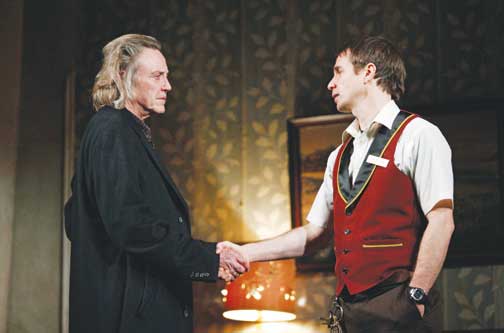


SERVICES
Tuesday March 23, 2010
Walken Gets Creepy In McDonagh's "A Beheading In Spokane"
Christopher Walken and Sam Rockwell in Martin McDonagh's "A Beheading in Spokan" (Joan Marcus) By Gwen Orel With "A Behanding in Spokane," Martin McDonagh discovers America. It's the first time he's originated a play on Broadway. And it's also the first time he's written a play set in America. It opened at the Gerald Schoenfield Theatre on March 4, and runs through June 16 only. "A Behanding in Spokane" takes place in a seedy hotel room in a small town in the U.S. (not Spokane; the title refers to an event that happened long before the play begins). It is a comedy-thriller about a man searching to buy his missing hand, who torments the kids who tried to swindle him. Yet it isn't only the fine cast that brings out a touch of the poet in these characters. It turns out you can set the play outside of Ireland but you can't take Ireland out of the play (or the playwright). As you might expect from McDonagh (particularly if you've seen "A Skull in Connemara" with its joyous hammering of bones; though the 2008 film "In Bruges" had plenty of violence too)) there are gross-out moments galore. As the curtain opens (literal stage curtain, pulled across the stage on rings, highlighting the theatricality of the 90-minute tale, in Scott Pask's clever set), we see Carmichael, played by Christopher Walken in fine, creepy form (though sometimes hard to hear), sitting on the bed while somebody bangs inside a closet. He opens the closet door and shoots, and we see one of his hands is a stump. The comic, startling yet logic of the moment is quintessential McDonagh. Mervyn (Sam Rockwell), the hotel factotum, arrives to ask about the noise, and asks what happened to the pretty blonde girl and black kid who went in with Carmichael. Don't be fooled by his seeming "normalcy," Mervyn has a sensitivity and pricklishness that makes him that makes him dangerous. Rockwell gets his boyish creepiness down pat. After he leaves, the blonde girl, Marilyn (Zoe Kazan), runs in and throws a hand at Carmichael. Toby (Anthony Mackie), the boy in the closet isn't dead, just stunned. Trouble is, the hand they try to sell him is black (they are petty swindlers). Trouble is, Carmichael is a racist (and a sociopath). Carmichael, in one of the funniest scenes, talks to his 90-something mother on the phone to reassure her that he's still a racist, though she's found a porn magazine with black women in it in his room. Carmichael has been searching for 47 years for his missing hand. When he was a boy in Spokane, a group of thugs took him to the train tracks and held his hand down while a train severed it, then waved goodbye to him with it. Or so he says. Without the Irish accent, you can easily see that McDonagh's language is as stylized as Damon Runyon's genteel gangsters (adapted by Jo Swerling and Abe Burroughs into "Guys and Dolls"). That's all right. This is a nightmare scenario structured as farce, not a slice of life. McDonagh loves the mundane interrupting the grotesque - as when Carmichael, about to leave his hostages with an explosive timer, pats himself down muttering "wallet, yes, keys, yes," then "see ya in a bit" as he exits through the window. Director John Crowley (who helmed "The Pillowman" in 2005, and is the other Irishman, with McDonagh) brings out the laughs and heightens the action. He also gets the most from a tour-de-force monologue from Mervyn. Kazan shrieks and flirts comically as Zoe, while Mackie's survival stratagems include sucking up to Carmichael that includes racial stereotypes. It's not a play for the easily offended or the squeamish. Carmichael: How you gonna explain all this
gasoline and blood?
But McDonagh, like Shepard, owes something to Beckett and Synge. Where Shepard waxes lyrical and poetic, McDonagh glories in the oddball and funny (lots of body part humor in Beckett). There's a desperate yearning underneath all of McDonagh's characters that is Irish to its core. Carmichael's repellant, but he's trying to become whole. When Mervyn tells him he won't be able to use the hand if he ever gets it he replies: "I know. But, y'know... it's mine. (PAUSE) It's mine." It may not be the story of Ireland, that search for the missing limb, but it reverberates. But, the grand guignol gross-out dominates, which is how it should be - there's a little to chew on, but not too much to weigh down McDonagh's dark romp. |
CURRENT ISSUE

RECENT ISSUES


SYNDICATE
[What is this?]
POWERED BY

HOSTED BY

Terms of Service | Privacy Policy
Website Design By C3I






